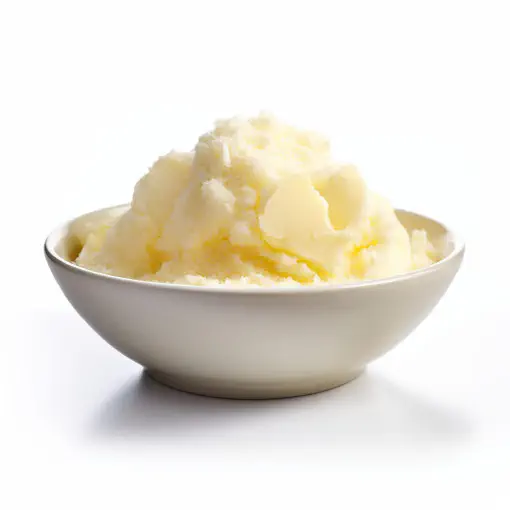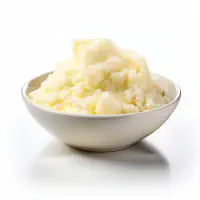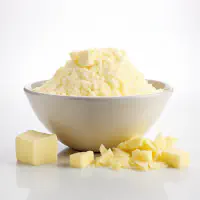
Palm stearin is a solid fraction of palm oil obtained through the fractionation process, known for its high saturated fatty acid content. It is commonly used in the food industry for stabilizing fats, producing margarine, and in the production of candles and soap.
Characteristics
-
Appearance:
Palm stearin is a solid fat at room temperature. It has a creamy white to pale yellow color and a smooth, waxy texture. -
Melting point:
Palm stearin has a higher melting point compared to palm oil. Typically, the melting point ranges from 45 to 55 degrees Celsius (113 to 131 degrees Fahrenheit). This higher melting point allows it to remain solid at higher ambient temperatures. -
Solidification:
Palm stearin solidifies into a solid form at room temperature due to its high saturation level. It forms a rigid, crystalline structure, which contributes to its stability and functional properties in various applications. -
Fatty acid composition:
Palm stearin consists primarily of saturated fatty acids. It has a higher proportion of stearic acid compared to other fats and oils. The stearic acid content lends palm stearin its specific characteristics and functionality. -
Thermal stability:
Palm stearin exhibits good thermal stability, meaning it can withstand high temperatures without undergoing significant degradation or breakdown. This property makes it suitable for applications that involve heat processing or frying. -
Texture and consistency:
Palm stearin possesses a firm, solid texture and a smooth, creamy mouthfeel. It provides a desirable mouthfeel and texture in food applications such as confectionery, bakery items, and margarine production. -
Oxidative stability:
Palm stearin demonstrates good oxidative stability, which helps it resist rancidity when exposed to air and light. This stability contributes to its enhanced shelf life and suitability for applications requiring longer storage periods. -
Functional versatility:
Palm stearin is a highly versatile ingredient, often used in the food industry for various purposes. It can be used as a structuring agent in margarine and shortening production, a hardening agent in bakery fats, a stabilizer in confectionery products, and a source of solid fats in food formulations.
These physical properties and features of palm stearin contribute to its suitability for a wide range of industrial applications, particularly in the food, confectionery, and bakery industries.
Palm stearin has a solid fat at room temperature and has a high melting point, typically ranging from 50 to 60 degrees Celsius (122 to 140 degrees Fahrenheit). Palm stearin is available in various grades based on its characteristics and properties.
Applications
The industrial usage of palm stearin varies across different industries. Here are a few common applications:
-
Food Industry:
Palm stearin is frequently used in the production of margarine, shortening, and various bakery products. It provides desirable texture and functionality to these food products, such as improving the creaminess and stability of margarine and enhancing the structure of shortening in pastries. -
Soap and Detergent Industry:
Palm stearin is used in the manufacturing of soaps and detergents due to its ability to create lather and its cleansing properties. It acts as a hardening agent and contributes to the durability and solidity of soap bars. -
Personal Care Products:
Palm stearin is employed in the production of cosmetics and personal care items, including creams, lotions, and lipsticks. It helps in enhancing the texture, stability, and smoothness of these products. -
Candle Making:
Palm stearin is commonly used in candle production as it provides structure and stability to the candles. It has a high melting point, which helps the candles hold their shape and resist melting easily. -
Animal Feed:
Palm stearin is included in animal feed formulations as a source of energy and essential fatty acids. It is often used in livestock and aquaculture feed to improve animal health and promote growth.
It is important to note that the usage of palm stearin may vary depending on the specific requirements and regulations of different industries and regions.


